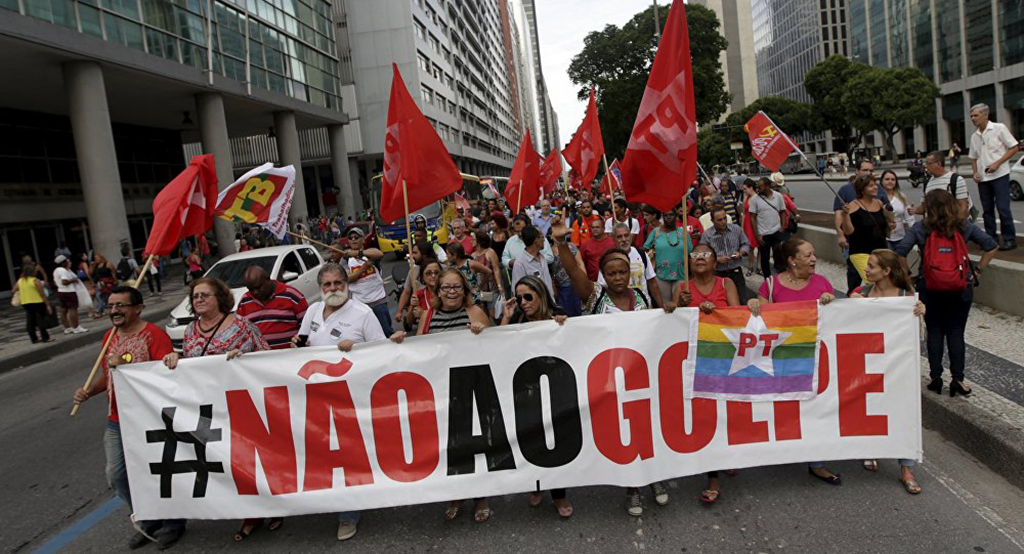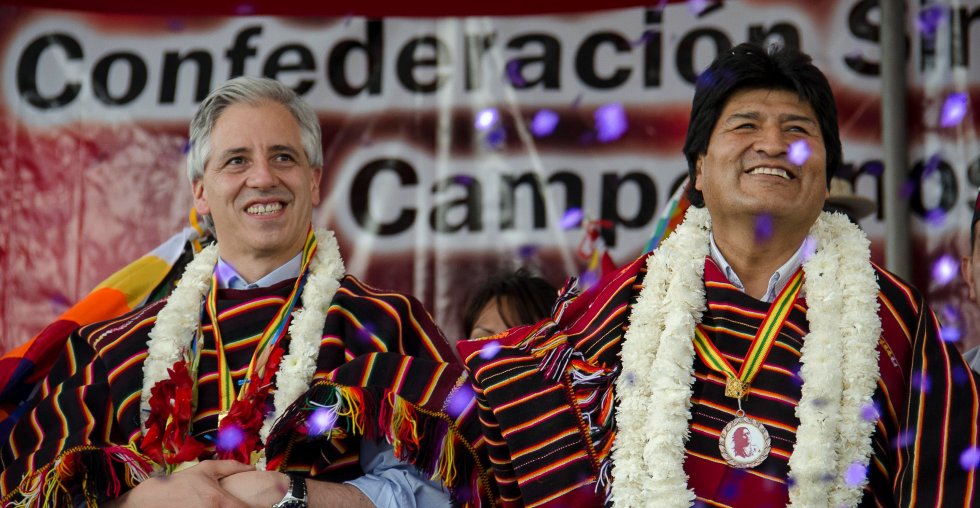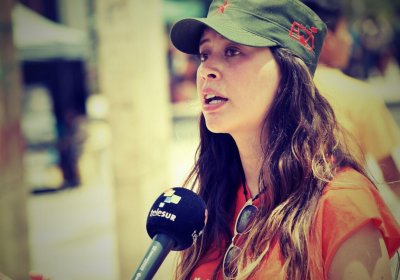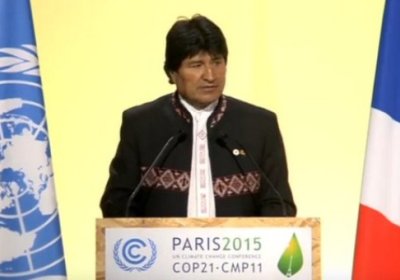 Anti-coup rally in Brazil.
Since the start of the 21st century, the left has won elections in most Latin American countries in a powerful wave of popular rejection of the disastrous neoliberal policies of the previous regimes.
One must however distinguish between two quite different sorts of left governments:
Anti-coup rally in Brazil.
Since the start of the 21st century, the left has won elections in most Latin American countries in a powerful wave of popular rejection of the disastrous neoliberal policies of the previous regimes.
One must however distinguish between two quite different sorts of left governments:
Bolivia
 Anti-coup rally in Brazil.
Since the start of the 21st century, the left has won elections in most Latin American countries in a powerful wave of popular rejection of the disastrous neoliberal policies of the previous regimes.
One must however distinguish between two quite different sorts of left governments:
Anti-coup rally in Brazil.
Since the start of the 21st century, the left has won elections in most Latin American countries in a powerful wave of popular rejection of the disastrous neoliberal policies of the previous regimes.
One must however distinguish between two quite different sorts of left governments:
A reform that better represents the nation's indigenous peoples has been implemented after a constitutional request by Bolivia's indigenous peoples of Yampara and the Sura people from Oruro department (state).
Bolivians can now add any cultural identity they want on the back of their ID cards, as the government of Evo Morales continues its efforts to build an inclusive society that better represents the nation's Indigenous peoples.
A joint review by Resistance: Young Socialist Alliance members.
This year's Students of Sustainability (SOS) conference, organised by the Australian Student Environment Network (ASEN), took place in Musgrave Park, Brisbane on Jagera and Turrbal country July 7-11. SOS started in Canberra in 1991 and is the longest running, annual student conference in Australia.
Socialist governments in Latin America must relaunch “democratic revolutions” in order to combat the strategies pushed by the United States to regain control of the region, Bolivian President Evo Morales said in an interview on May 23.
“In some countries it should be like a wake-up call where [governments] must start permanent conferences to relaunch democratic and cultural revolutions for Latin America and the Caribbean [region],” Morales said in an interview with Cubavision.
 A community assembly as part of a communal council in Caracas. Photo by Rachael Boothroyd Rojas/Venezuela Analysis.
Leading Marxist author Michael Lebowitz spent six years (2004-2010) in Venezuela working as a director of the program for Transformative Practice and Human Development at the Miranda International Centre (CIM) in Caracas. There, he had the chance to take part in the building of socialism for the 21st century.
A community assembly as part of a communal council in Caracas. Photo by Rachael Boothroyd Rojas/Venezuela Analysis.
Leading Marxist author Michael Lebowitz spent six years (2004-2010) in Venezuela working as a director of the program for Transformative Practice and Human Development at the Miranda International Centre (CIM) in Caracas. There, he had the chance to take part in the building of socialism for the 21st century.
Valeria Silva is a deputy in the Bolivian Plurinational Assembly for the governing Movement for Socialism (MAS) party of President Evo Morales, and a leader within the MAS youth wing.
 Bolivian Vice-President Alvaro Garcia Linera and President Evo Morales.
The “no” vote narrowly won with 51.3% of the vote in a February 21 referendum in Bolivia held to resolve whether left-wing President Evo Morales could run again in 2019.
The vote, involving an unprecedented participation rate of 90% of registered voters, was over whether to change the constitution to allow a president and vice-president to stand for re-election twice.
Bolivian Vice-President Alvaro Garcia Linera and President Evo Morales.
The “no” vote narrowly won with 51.3% of the vote in a February 21 referendum in Bolivia held to resolve whether left-wing President Evo Morales could run again in 2019.
The vote, involving an unprecedented participation rate of 90% of registered voters, was over whether to change the constitution to allow a president and vice-president to stand for re-election twice.
The 2016 summit of the Community of Latin American and Caribbean States (CELAC) began on January 26 with the meeting of foreign ministers and chancellors of the Latin American nations at the headquarters of the Union of South American Nations (UNASUR) in Mitad del Mundo, Quito, Ecuador.
CELAC, a regional body involving all nations in the Americas except for the United States and Canada, was officially created in Caracas in 2011 under the leadership of then-Venezuelan president Hugo Chavez.
Bolivian President Evo Morales has blamed capitalism for environmental destruction during his speech at the opening plenary at the United Nations COP21 climate summit in Paris, France, TeleSUR English said on November 30.
Morales called capitalism “the formula that has destroyed our species” and delivered a manifesto to save Mother Earth and life.
The Bolivian government's national contribution to the COP 21 climate talks scheduled to start in Paris on November 30 contains a series of radical proposals for safeguarding the future health of the planet, Euractiv.com said on October 14. Bolivia's contribution insists that capitalism is responsible for “consumerism, warmongering and [...] the destruction of Mother Earth”.
“For now, we are discussing a problem left to us by capitalism - climate change.” This was the conclusion of Bolivian President Evo Morales in his closing remarks to the October 10-12 World People's Conference on Climate Change and the Defence of Life in Cochabamba.
More than 5000 people from more than 40 countries took part in the summit, established to give a voice to the poor and marginalised victims of climate change. Proposals and demands agreed on at the summit will be taken directly to the United Nations climate talks in Paris starting on November 30.
 Evo Morales.
Bolivia is calling for investigations into cables leaked by WikiLeaks that reveal the US had plans in 2008 to topple the left-wing government of President Evo Morales, including potentially backing his assassination.
“This requires an in-depth investigation,” said Bolivia's minister of the presidency, Juan Ramon Quintana. “We need to do an investigation to subsequently take decisions with regard to the United States government.”
Evo Morales.
Bolivia is calling for investigations into cables leaked by WikiLeaks that reveal the US had plans in 2008 to topple the left-wing government of President Evo Morales, including potentially backing his assassination.
“This requires an in-depth investigation,” said Bolivia's minister of the presidency, Juan Ramon Quintana. “We need to do an investigation to subsequently take decisions with regard to the United States government.”
- Previous page
- Page 6
- Next page







